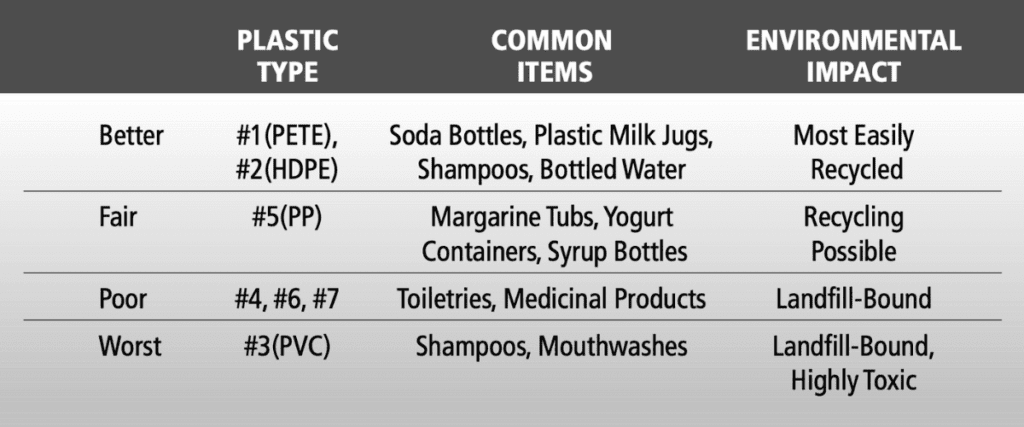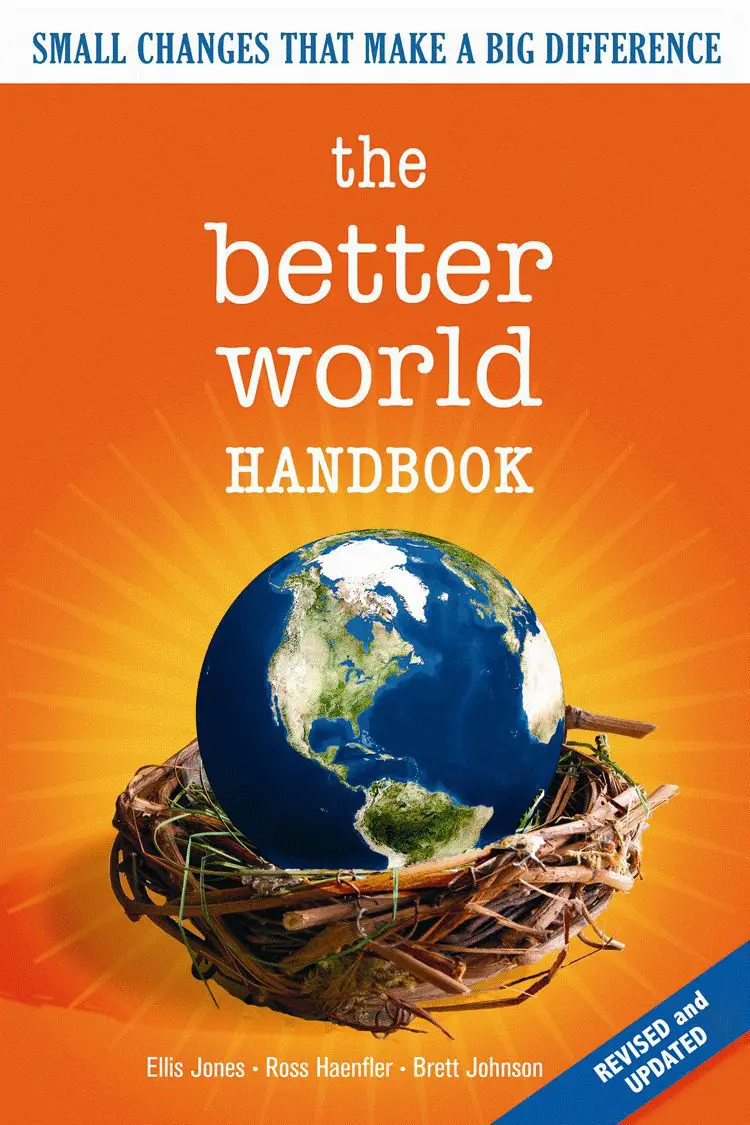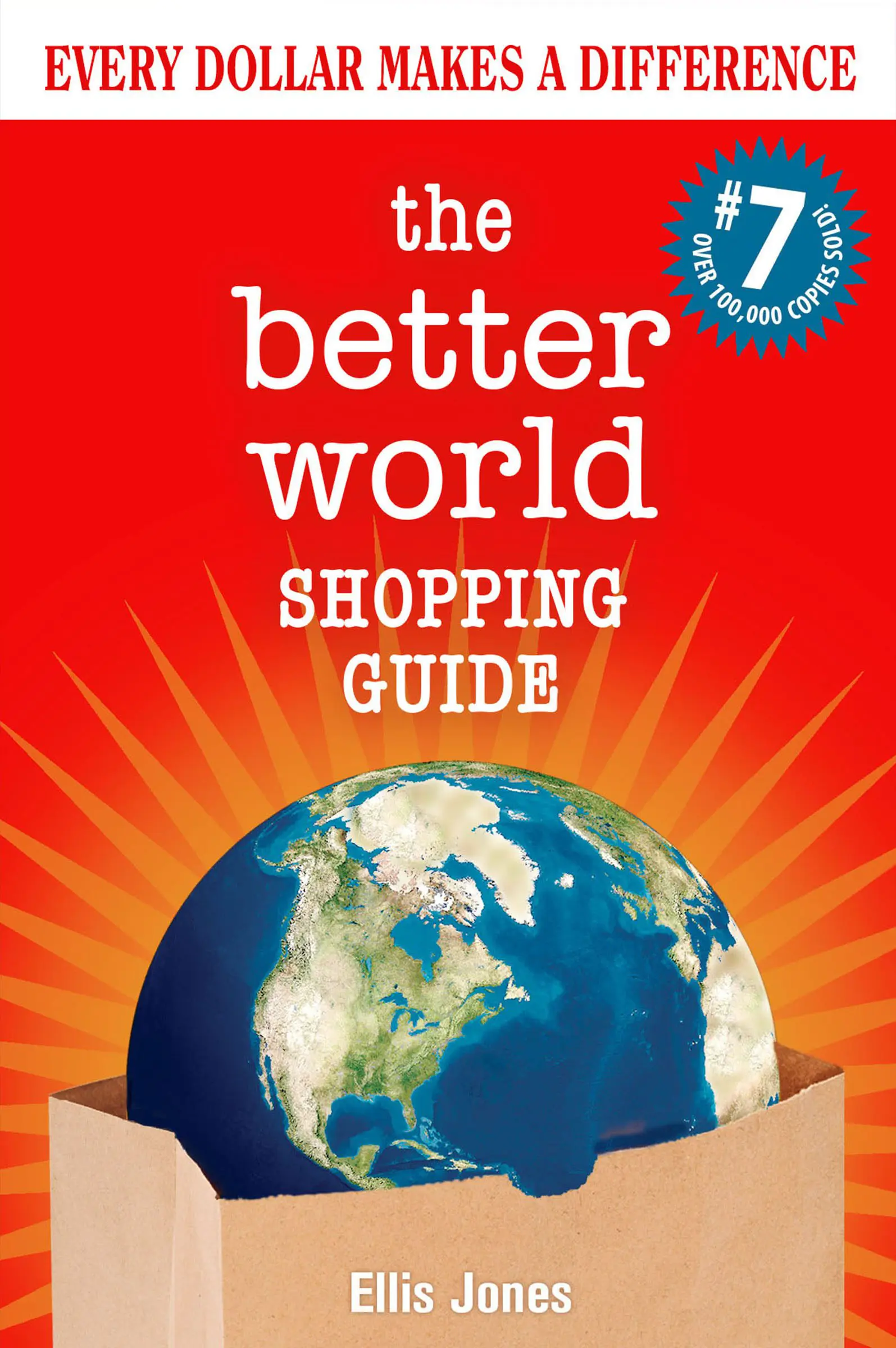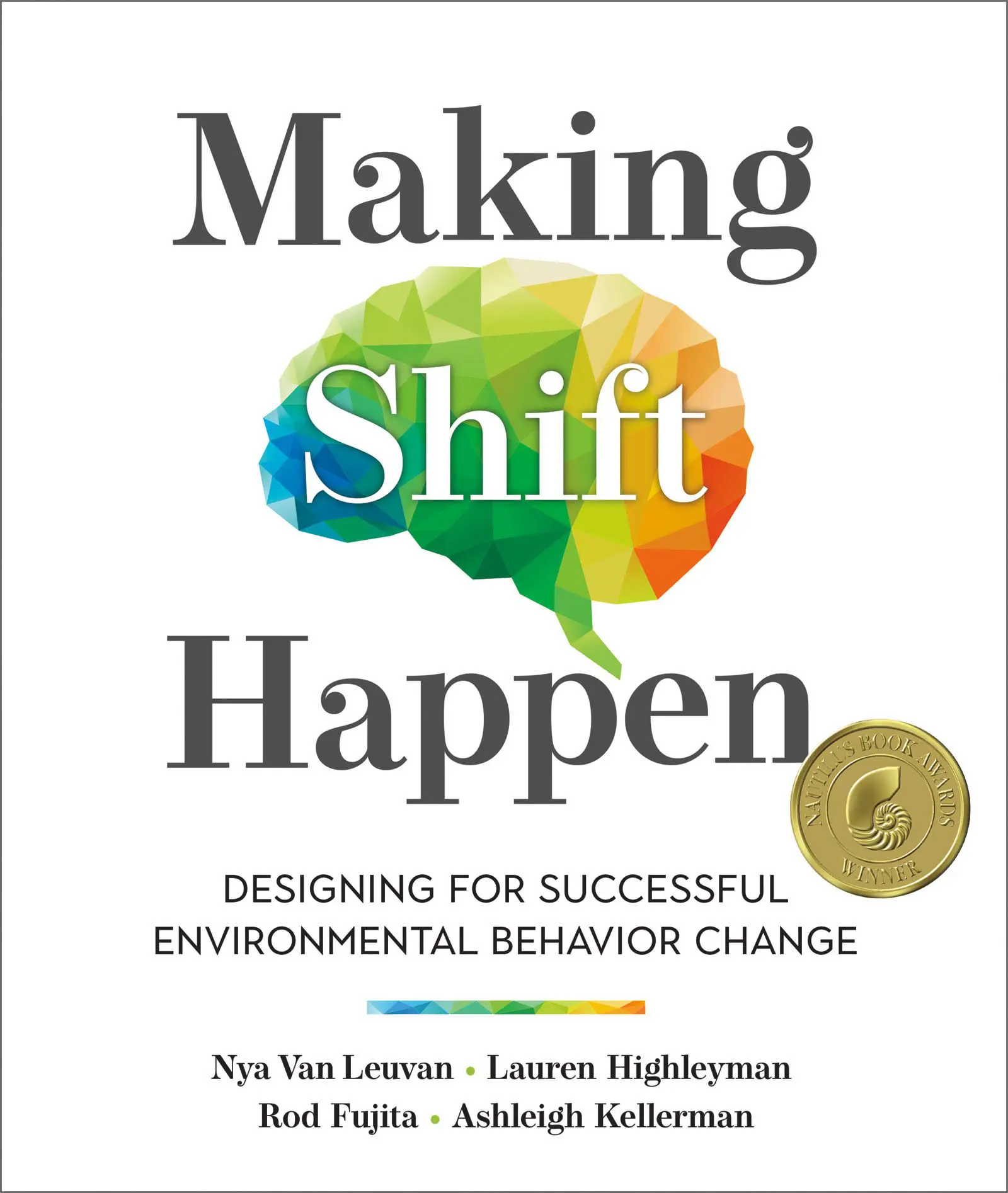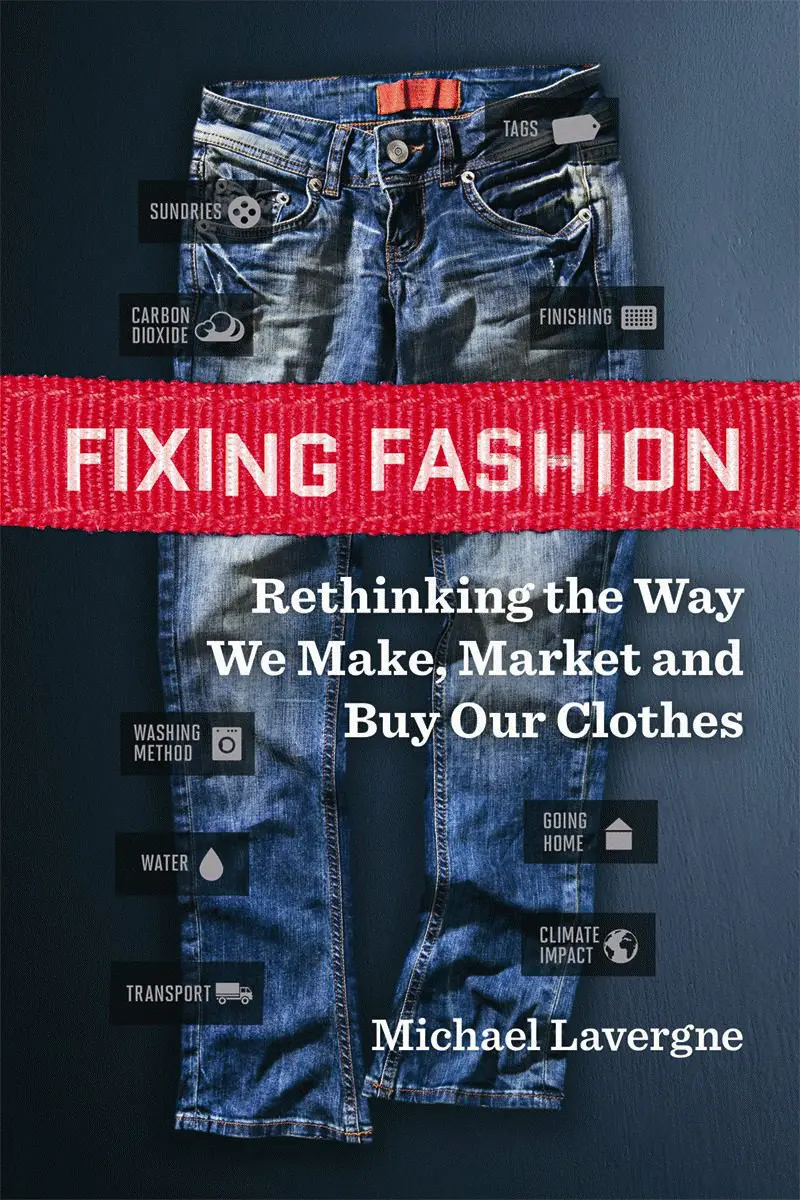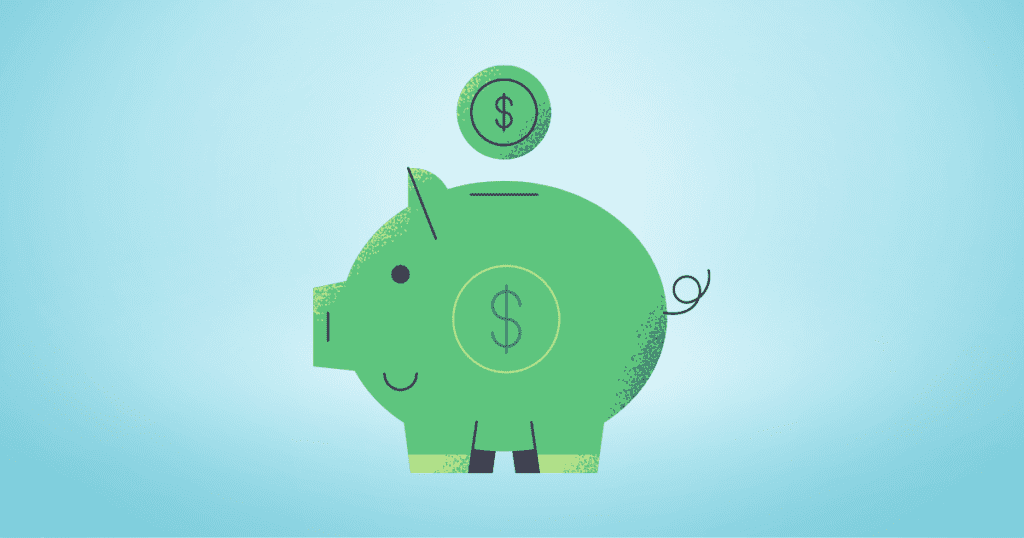
Shopping plays a big role in our lives—it can be part of how we celebrate, treat ourselves, or show we care. But have you ever stopped to think about the bigger picture? Every purchase we make has an impact, from the environment to the people and communities behind the products.
In The Better World Handbook, Ellis Jones makes it easy to shop more consciously by focusing on sustainability, fair labor, and community impact. This excerpt offers simple, practical tips to help you make choices that align with your values—without adding any extra stress to your day.
Shopping is a cherished ritual in the United States. A weekly pilgrimage to the local mega-mall has become more common than attending religious services. We often use shopping to meet our emotional needs. If we are happy, we go buy ourselves something to celebrate. If we are sad, we go buy something to make ourselves feel better. If we feel lonely, we go to the mall. If we fall in love, we go buy the person something to show our love. Surprisingly, for all the time we Americans think about and spend shopping, we haven’t put much thought at all into how all of these purchases affect the world around us.
Every product on your favorite department store’s shelf is made of a collection of natural resources that humans have extracted or harvested from the Earth. These raw materials were then transported, processed, and transported again to the store where we see them on the shelf — all with the integral help of our fellow human beings.
This chapter is about transforming the way you look at shopping. It will help you to consider the social and environmental impacts of the products and services that you buy. It will then be up to you to decide how these social and environmental considerations fit into the other factors that are important to you (price, quality, color, features).
This may sound a little overwhelming, but in fact we’ve done a lot of the leg work for you to make sure your decision is as simple as possible. The following suggestions will help you use your purchasing power to support your community, the planet, and the businesses that you would like to see flourish — ones that create safe and positive work environments for employees, pay fair wages, nourish their communities, create quality products, and practice environmental sustainability on a daily basis.
ACTION: Resist the urge to go shopping
For some of us, we shop whether we need something or not. Shopping has become entertainment. Resist the urge to go shopping! When you get bored, do something creative instead of going to the store and buying things you don’t need. You’ll end up saving hundreds of dollars and hours, avoid accumulating more clutter, and give the planet a much-needed breather.

DON’T GET SUCKERED IN BY SALES
Virtually every occasion gets its own sale: we have Father’s Day sales, Labor Day sales, after-Christmas sales, 4th of July sales — the list goes on and on. North America is sale crazy. If you get the Sunday newspaper, you receive a huge stack of colorful inserts advertising cheap goods. Sales are clever ploys to get you to buy stuff you don’t need. Just because you can get a brand-new Thighmaster for $19.95 doesn’t mean you need one!
ACTION: Buy less stuff
Sometimes it seems as if people in our society are in a contest to see who can fill their house with the most stuff. Because our culture trains us to be consumers, we are often unaware of the many, many benefits to being frugal. Remember, everything you own owns you. Everything you buy you must maintain, store, repair, clean, and perhaps insure. Our stuff quickly becomes a psychological burden. The more you buy, the more money you need, which increases your work time at the expense of your family and friends. Finally, all of our stuff takes natural resources to produce, making everything we buy environmentally costly. Here are a few pointers to help you buy less stuff:
- Fix broken things: Our disposable culture encourages us to replace broken items even when they are relatively easy to fix. Just because you can afford a new lawn mower doesn’t mean you shouldn’t try to fix your old one.
- Reuse stuff: You can reuse many so-called disposable items, such as paint brushes, sandwich bags and plastic containers.
- Borrow from friends: Borrowing saves resources, money, and time and also helps build community. Check out books, movies and CDs from your local library. Ask your friend if she has a pipe wrench, since you only need it for a day or two.
- Ask yourself, Do I really need it? Advertising makes us feel as if we’ll be left out if we don’t have the latest gadget or name brand clothing. When it comes down to it, we don’t need much of what we buy.
- Take a shopping list: Plan ahead before you shop. Decide exactly what you want before you go; otherwise fancy displays, colorful packaging and salespeople might convince you to buy something you don’t need.
- Avoid impulse buys: Companies actually design their stores to encourage impulse buying. Do you really need any of that junk that surrounds you in the check-out line? One powerful technique to avoid impulsively buying big purchases, such as a new stereo, is to wait two weeks before you buy it. If you still really want it, then get it.
ACTION: Treat workers with respect and courtesy
No matter where you shop or what you are buying, be sure to treat the employees (and other customers) with dignity, respect, and friendliness. Being treated like a fellow human being is far superior to being treated like an inanimate object or a subordinate. Show your appreciation when someone goes above and beyond the call of duty. Even though it can be difficult, be sure not to take your anger out on workers for policies and products that they did not create. You can complain about a purchase or policy while treating the other person with respect.
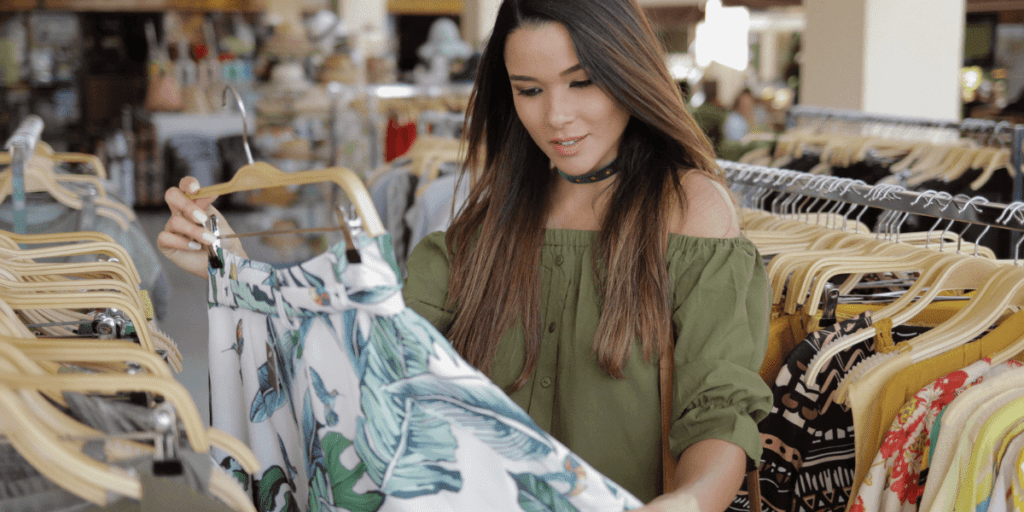
What to Buy
We grow up buying things unconsciously, never giving a second thought to how our purchases affect the world. There are ten basic questions you can ask yourself about any product before buying it:
- Can I find it used?
- Will it last a long time?
- Is it reusable or at least recyclable?
- What are the item and its packaging made from?
- How will I dispose of it?
- Is it toxic?
- What conditions do the workers who made it work under?
- How much will it cost to maintain it?
- Is it a good value?
- Will my buying it contribute to a better world?
You probably can’t answer every one of these questions about every product. That’s OK. The point is to increase your awareness and do your best. You won’t become a conscious shopper overnight.
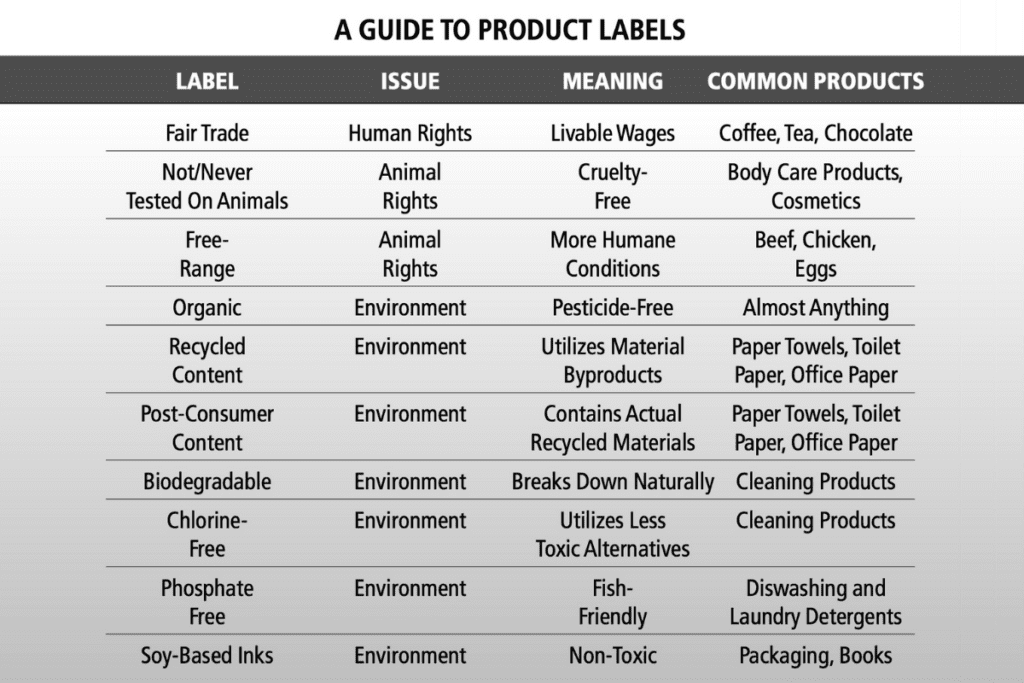
ACTION: Buy used
Buying used products is a great way to lessen the demand for natural resources. Some of the more popular used items include books, compact discs, clothing and cars. But you can also easily find used appliances, computers, bikes, baby clothes, toys and furniture. Check out garage sales, thrift and second hand stores, pawn- shops and the classifieds. When you buy a used item you:
- Conserve the energy and resources that would have been used to supply you with a new item
- Promote a sustainable rather than a throwaway society
- Retain your money for more fulfilling activities
Craig’s List (www.craigslist.org)
Craig’s List is the wildly successful internet version of local classified ads. People post (at no charge) what they have or want online along with an email, phone number, or anonymous contact information. You can find just about anything you’re looking for very quickly in or around your home town. It keeps dollars in your community, you don’t have to pay for tax or shipping, and you usually save something from the landfill to boot!
The Freecycle Network (www.freecycle.org)
Think of Craig’s List. Now imagine all of the stuff is free. The Freecycle Network looks to connect those who want to get rid of something with someone from their community who wants it. If you’re interested in creating a local network where people help each other just because it’s good for the environment AND good for the community, take a look!
eBay (www.ebay.com)
eBay is the popular Internet auction site where any registered user can buy or sell virtually anything. It’s likely someone is selling exactly what you’re looking for, no matter how obscure. You can register and search for free. eBay is also a great place to get rid of the stuff you no longer need.
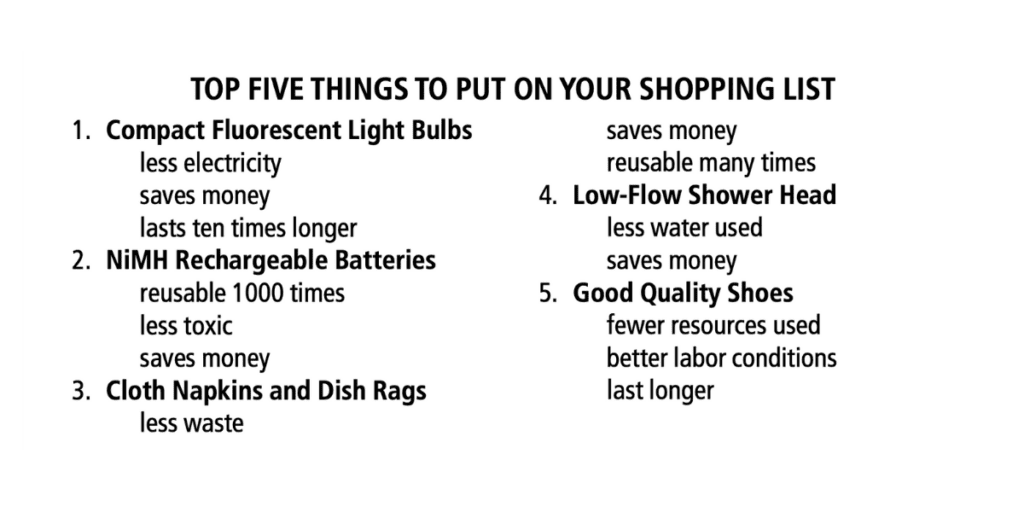
ACTION: Buy durable and reusable products
In North America, we demand cheap goods and we get what we pay for. It’s so easy to just throw away cheaply-made products because we never have to see them again; our garbage just “disappears.” In the long run, it’s better to spend a little more money for more durable goods that you can reuse, and therefore don’t have to repair or replace all the time. By purchasing reuseable, durable items, you save landfill space, money and natural resources.
It only takes a little research to determine a product’s quality. You can find issues of Consumer Reports at your local library that you can use to compare models’ reliability and quality.
ACTION: Buy products with minimal packaging
Product packaging sometimes requires more resources than the product itself. Some important
questions to ask yourself before you buy are: “What is the packaging made of?” and “What will I do with it when I’m done?”
Cloth bags aren’t just for grocery shopping. Remember to bring them with you whenever you plan to shop.
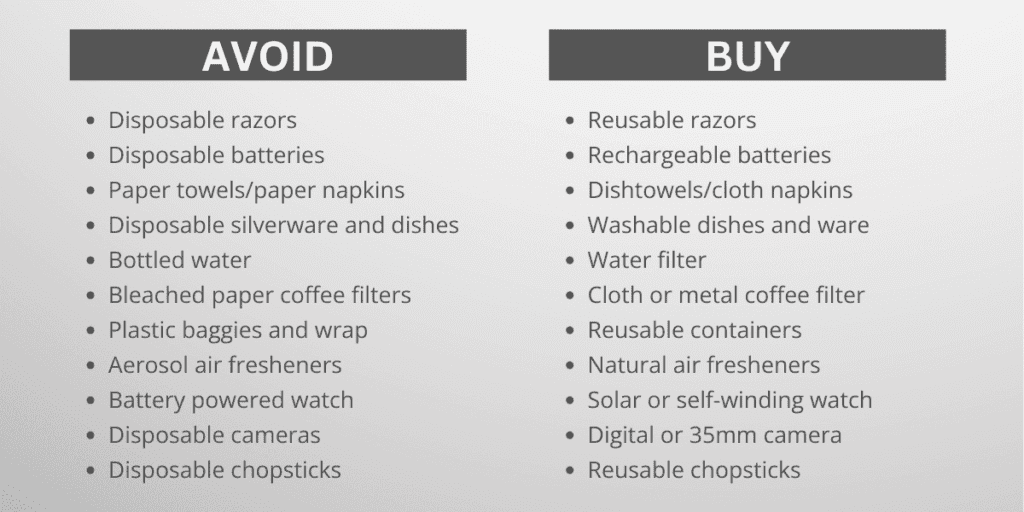
Plastics
Not only do plastics produce pollution when they are manufactured but, unlike glass and aluminum which can be recycled virtually forever, plastic can usually only be recycled once, if that. Also, while the market for many recycled materials remains robust, recycling plastics currently has very tenuous economic benefits. Avoid plastic items whenever possible. If you are going to buy plastic items, buy things that you will be able to reuse.
Whenever possible, buy products with less packaging (for example, buy in bulk), packaging made from recycled materials, packaging you can recycle, or biodegradable packaging.
